- Home
- Brian Falkner
The Assault Page 20
The Assault Read online
Page 20
Then the canyon narrowed again, the water deepening and the speed increasing. The slope was much steeper here. He made another sharp turn to the left and in front of him he saw certain death: a clump of massive boulders. The water was hitting the boulders at full force, smashing and spraying up into the air, then over and around them.
He braced himself for the impact.
The first boulder rose up above him, but a giant hand from below seemed to lift him as the water surged up and over. His boots scraped the top of the boulder; then he flew through the air and splashed back down into a torrent on the other side. He kept his head above water long enough to look back and see Price flying over the same boulder with Wilton right behind her, arms windmilling through the air.
Finally the ride became smooth, like a waterslide at a fun park, and steeper again. A sharp turn to the left, a sweeping curve to the right. He saw the ground approach, a pool of darkness in the shadow of the cleft in the side of the rock. Then with a whoosh and a roar of bubbles he was underwater—deep underwater—and sinking.
He tried to swim up to the surface, but it was impossible in his heavy armor and boots. His outstretched arm connected with a rock on the edge of the pool, and he dragged himself forward underwater, his lungs screaming. He felt a shock as a large object exploded into the water beside him—Price.
Chisnall reached over and grabbed her, pulling her along with him.
Another surge of water as another body hit the deep pool, and then another.
His hand closed on a metal bar, and he used it to pull himself up. Then he found another bar, a metal railing out of the water. He looped an elbow around it and pulled Price up beside him. She coughed, choked, and vomited water, but her other hand had a steely grip on Wilton’s collar and a moment later he, too, was grasping the metal railing, gasping, choking, but alive.
“Monster?” Chisnall called out.
“Here,” came a voice that he could not have been happier to hear.
He turned and saw the big Hungarian clinging to a rock on the far side of the pool.
“You fall in too?” Chisnall grinned.
“Fall in? My dude! The Monster jumped in,” Monster managed, gasping in air. “You guys looked like you were having so much fun.”
“Anybody break anything?” Chisnall asked.
“All Oscar Kilo,” Wilton said.
“I think I sprained my wrist,” Price said. “I’ll be fine.”
“The Monster thinks he sprained his arse,” Monster said. “But he can walk.”
“Let’s get out of here,” Chisnall said. “Try and put some distance between us and this rock before those Pukes in the air shaft catch up with us.”
“Where the hell are we?” Wilton asked.
“The rock pool at Mutitjulu,” Chisnall said. “We’re not far from the main entrance, if I remember the geography of Uluru correctly. How long have we got before the warhead blows?”
“Don’t know,” Monster said.
Chisnall swung a leg over the railing and waded through the knee-deep water on the other side. It became more and more shallow until he was on a concrete path. Before the Pukes came, this was the trail that had brought tourists to the rock pool. They had been clinging to the tourists’ safety fence. Now the whole lot was underwater, and judging by the surging water that flowed down from the side of the rock, it was going to get deeper quickly.
He stared for a moment at the raging waters above his head, finding it hard to comprehend that the four of them had come down that and survived.
Price was holding her sprained arm with her other hand. He stopped.
“Let me look at that,” he said.
“I’m Oscar Kilo,” she said with a gritted smile.
He ignored her and took her arm. Her wrist hung limply and at an odd angle.
“Sprained? Like hell,” Chisnall said. “It’s broken.”
That was the hand he had hauled her out of the pool with, but she hadn’t screamed, hadn’t complained at all.
“We’ve got bigger things to worry about than my wrist,” Price said, looking back at the rock.
It was hard to disagree with that.
“Rip off your bomb squad markings,” he said, and helped Price with hers.
Ahead of him, through the thundering rain, Chisnall could see the sweeping curve of the monorail track heading left, back toward the entrance of the rock. The concrete path they were standing on came to a fork, one branch leading back toward the entrance and the other heading out among the buildings and streets of the Bzadian base.
The last place he wanted to be when the warhead went off was near that entrance. But he changed his mind as a dark shape caught his eye.
“This way,” he said, heading to the left.
“Are you sure, LT?” Monster asked.
“Look,” Chisnall said, pointing.
Through the high-security fence that blocked off access to the tunnel buildings, they could see the abandoned battle tank, its main gun shattered. It sat next to the remains of the Uluru entrance building, a jumble of stone blocks. Beyond it, a huge, wheeled crane had just lowered the edge of the second battle tank to the ground. The tank that had capsized earlier. The tank’s crew stood around it, waiting for the crane to unhook.
The Angel Team got to the fence and skirted around the outside to the gaping hole where the tanks had originally busted their way through.
A technician climbed out of an access panel of the first tank as they approached.
“How is it?” Chisnall asked, as if he had every right to be there.
The technician looked around, protecting his eyes from the rain with his hand. If he was surprised at the sight of the four bedraggled soldiers, he didn’t show it. Everybody was soaking wet anyway, Chisnall realized, from the thunderstorm.
“It’ll be pretty shaken up in there,” the worker said, “and the main gun is out, but I got the electrics working again. Are you the maintenance crew?”
“Yes,” Chisnall replied.
“They said you wouldn’t be here until tomorrow,” the worker said. “I’ll have to get clearance from my supervisor. Apparently there’s a group of terrorists running around.”
“There is,” Chisnall agreed. “They’re in there.” He pointed to the rock. “And the whole rock is about to explode. Haven’t you been given evacuation orders?”
The worker looked frightened. “Evacuation? No. Nothing!”
“Get moving, now! We’ll see if we can get this tank to safety. Go!”
Chisnall didn’t wait for an answer. He ducked underneath the metal rim of the tank, the others right behind him.
“You need to wait for clearance,” the worker said behind him. “Hey!”
Chisnall ignored him. The entrance hatch was open, and he clambered up into it, reaching back and giving Price a hand so that she could avoid putting weight on her wrist.
Only a dim glow from an emergency light lit the interior. They were in a kind of well, a circular depression in the base of the tank. A short ladder led up to the control center.
They climbed the ladder and found two sets of controls on one side that were clearly for steering the tank, while two on the other side were for the weapons systems.
“Hey!” Chisnall heard again from outside, but it was cut off by a metallic clang as he found a lever on the control panel that slid the hatch shut.
Chisnall slid into the driver’s seat. It was large and padded. Surprisingly comfortable. It occurred to him that the padding might be protection against the shock of explosions outside the hull rather than a creature comfort.
The rain was a muted thrum on the outer shell of the tank.
Price slid into the seat next to him. That would be for the tank commander, or possibly a navigator. Maybe a communications officer.
The desk in front of him was covered with lights, buttons, readouts, and switches. It looked like the control panel of a jetliner.
Price put something down on the desk, and a dim, red
flash caught Chisnall’s eye. The transmitter. Somehow she had managed to hang on to it throughout the wild slide down the rock and the plunge into the pool. All with just one good arm.
“Better leave this running,” Price said. “Otherwise our rotorcraft ride home is likely to bug out at the sight of a Bzadian battle tank.”
“True,” Chisnall said. “Now let’s see if we can work out how to drive this thing.”
Price moved her good hand and pressed a switch. The interior cabin filled with light. Screens lit up around them. There were no windows, Chisnall realized. No grilles. No way of looking out. That couldn’t be right. They had to see where they were going.
A helmet hung on a hook to the right of the desk. A thick wire protruded from the base of it. He put it on and a visor flicked down over his eyes. Suddenly he was looking outside the tank. Images from cameras embedded in the hulls were projected in front of his eyes. If he turned his head, the view moved. He twisted around and found he was looking directly behind the tank. He had full 360-degree vision, yet he was securely encased inside the machine.
Somehow the control panel in front of him was still visible, a ghostly image that seemed to be superimposed on the world outside. He turned toward Price and could see her reasonably clearly. He found that if he focused his eyes on the outside world, it became clear, and if he focused on the inside of the tank, it moved into sharp focus. He wasn’t sure if it was his eyes doing that or some clever trick of the helmet software. Price was putting on a helmet of her own.
“Wilton, Monster, get on the gunnery controls,” Chisnall said.
“The gun is out,” Wilton said. “Thanks to Monster.”
“Some people are never happy,” Monster said.
“See what other armaments there are,” Chisnall said.
Price found a starter button, and the machine shuddered into life before settling down into a smooth purr that smothered the sound of the rain. Chisnall examined the rest of the controls. Moving the tank seemed simple. It was controlled by two palm-sized knobs. He turned the knob on the left and the tank slowly rumbled forward, toward Uluru. The other one must be for speed.
“Wrong way,” he muttered, and eased the right-hand knob around. As he did, there was a feeling of movement, and he realized that the cabin had rotated inside the tank, automatically orienting itself to the direction of travel.
The controls made human vehicles—with their gas pedals, brakes, steering wheels, and forward and reverse gears—seem hopelessly complicated. One knob for speed. The other for direction. The tank could move in any direction. So to go in reverse, he would simply turn the right-hand knob in that direction.
“And now we just roll on out of here,” Wilton said.
“It’s that simple,” Chisnall said, not quite believing it.
“It’s not that simple,” Price said.
He turned to look where she was looking.
“I don’t believe it,” he said.
Yozi, indestructible Yozi, and the big soldier, Alizza, were running toward them, weapons in hand.
“Time we got moving,” Chisnall said, and spun both knobs.
The machine surged forward, heading right for Yozi.
Chisnall kept it on course for a moment, watching Yozi and Alizza throw themselves to the side, out of the path of the raging tank. A fence in front of them was quickly gone, trampled under the huge ball wheels of the tank. Then he steered the tank back onto the approach road. The road led into the city, and from there they could find their way north.
“This is madness. We’ll never make it,” Price said.
“Doesn’t stop us trying,” Chisnall said.
He glanced around and saw Yozi and Alizza running toward the other tank, yelling at the tank crew. The crew scrambled inside. Now the other tank was accelerating.
“How are those guns coming?” Chisnall asked calmly.
“I think we found the fire button,” Monster said.
“You’re gonna need it,” Chisnall said. He twisted the speed knob around as far as it would go and the tank charged toward the low outer fence line.
Price was studying the controls. She pressed a large red button, and around them the hull of the tank began to vibrate. It started as a hum, then became a high-pitched whine as the hull started spinning.
The outer fence line was rapidly approaching. In just a few meters, they could lose themselves between the big stone buildings beyond it. But a quick glance back showed the gun turret of the second tank was coming around to aim at them.
“Incoming!” he yelled.
There was a flash from the other tank’s gun, then a clang on the outer hull, followed by an explosion from one of the buildings. Smoke and dust billowed around them.
“What the hell?” Wilton asked.
“Takes a direct hit to kill one of these things,” Chisnall said. “Anything else ricochets off.”
They had made it between the buildings, racing down the narrow street, away from Uluru, out of sight of the following tank—for the moment, at least.
Chisnall gritted his teeth and steered around a tight corner to the right, to the north, toward the base boundary and the desert beyond. They almost didn’t make it. The outer edge of the huge tank gouged a long scar along one of the buildings, but then they straightened, and Chisnall twisted the speed knob back to maximum. Full speed ahead.
A Land Rover was parked to one side. He ignored it and felt the tank rise up slightly as it rolled over the top, crushing it.
A truck turned a corner and approached them head-on. The street was not wide enough for them both. The truck swerved madly from side to side, then smoked poured from its brakes. The driver burst out the door, fell, and rolled in the street before jumping up and running to flatten himself against a building.
The tank hit the truck off center and carried it down the road for ten or twenty meters before the back of the truck slipped sideways, striking one of the buildings and wedging there. The chassis was crushed and the cab exploded in flames.
“I got twin heavy coil-guns,” Wilton said. “Locked and loaded.”
Machine guns wouldn’t do much against a battle tank, but it was better than nothing.
“Aim for the barrel,” Chisnall said. “That worked once before.”
Chisnall felt the weight of the tank shift slightly as the turret and the mangled barrel of the tank’s main gun rotated around to the rear.
There was a thundering sound as the second tank turned the corner and appeared behind them. In the video visor, Chisnall saw Wilton’s tracer rounds spark off it.
The other tank fired. There was another clang from the hull and a building shattered and collapsed in the street behind them. Their pursuers had to slow as the tank climbed over the jagged rock in its path.
That gave Chisnall an idea.
He spun the tank wide around another corner, another tight side street. He deliberately let the tank climb up onto the sidewalk and into the curved stone side of a tall, thin building. Stone exploded in every direction; then they were past. The building, robbed of its base, tottered for a moment, then toppled, huge chunks of rock completely blocking the street.
The second tank appeared, smashing through some of the rubble before slowly clambering up over the rest. As the front of it rose up, Wilton hit them with the heavy coil-guns, hoping to strike the more delicate underside of the tank.
“Damn,” he said as the rounds just bounced off.
Chisnall turned and turned again, hoping to lose their pursuers in the maze of side streets.
He continued to head north, toward the outer barrier, the lake, and their only hope of salvation. Cars and jeeps disappeared under the massive ball wheels of the juggernaut. Fuel tanks exploded, jarring the tank but not damaging it in the slightest.
The other tank appeared on a parallel road, visible down a side street.
“To your left!” Chisnall yelled.
The turret rotated, but they were already past the intersection, and the o
ther tank was hidden behind tall buildings.
They were almost to the outer perimeter wall when the second tank appeared behind them, firing. Another, much heavier clang from the hull told Chisnall that their enemy was finding its range. There was a sudden plume of dirt out in the desert as the shell ricocheted off and exploded, although the rain quickly washed it out of the sky.
They smashed through the low boundary wall, the tank juddering over the crushed remains.
The going was faster over the flat, open desert, but here there was nothing to hide behind. Chisnall veered the big machine from side to side, not wanting to give Yozi an easy, steady shot.
Wilton fired continuously but had no effect on the thick, spinning metal of the other battle tank.
But the enemy tank did not return the fire.
“Fast movers, eight o’clock,” Price said, her eyes on a radar screen. “Two of them.”
Chisnall glanced to the left. Two type ones, screaming in from the west, below the heavy rainclouds. Death from the sky. No tank hull could survive a direct hit from a Bzadian jet’s missile.
“LT!” Price yelled, pulling his attention back to the front.
Before them, rising out of the desert, was the ugly, multi-pronged shape of a Bzadian gunship. It was a three-sided attack, Chisnall saw, and there was no way out. Behind them, the tank; in front, the gunship; and high in the sky, silhouetted above Uluru, the two alien jets.
There was no chance to escape. No hope left. And no panic. He felt calm, perhaps because of the sheer hopelessness of the situation. Death was coming fast, and there was absolutely nothing he could do about it.
“Been a good effort, team,” he said.
That was when Uluru began to dance.
It shuddered, as if terribly afraid, and fire burst out of the side of the rock, through the tunnel entrance. Another shaft of fire, like a man-made bolt of lightning, appeared at the top of the rock, in the cleft—the ventilation shaft. It was so powerful that even the clouds parted around it.
The entire top of Uluru seemed to rise up, as if drawing in a breath. Then the rock exhaled through the monorail tunnel, and all hell came with it. A billowing, fiery shock wave punched straight through the base behind them.

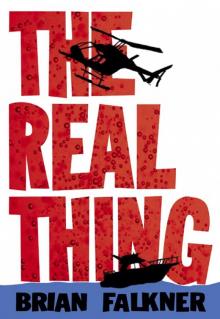 The Real Thing
The Real Thing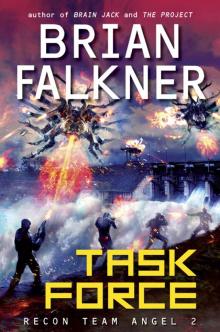 Task Force
Task Force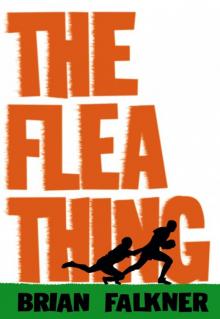 The Flea Thing
The Flea Thing The Project
The Project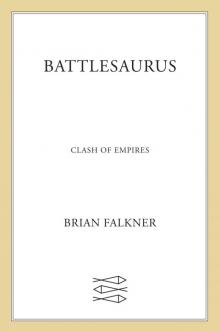 Clash of Empires
Clash of Empires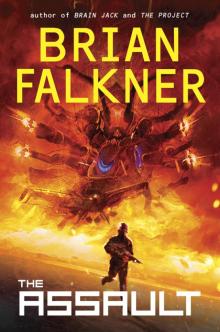 The Assault
The Assault Brain Jack
Brain Jack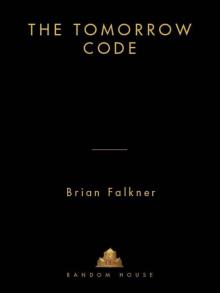 The Tomorrow Code
The Tomorrow Code Vengeance
Vengeance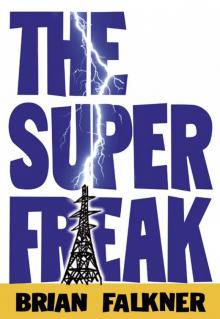 The Super Freak
The Super Freak Northwood
Northwood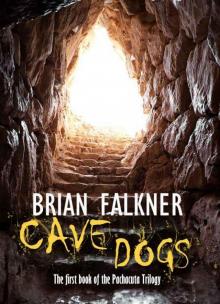 Cave Dogs (Pachacuta Book 1)
Cave Dogs (Pachacuta Book 1)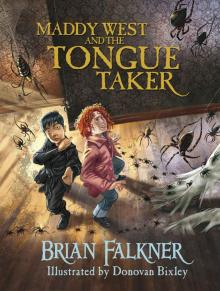 Maddy West and the Tongue Taker
Maddy West and the Tongue Taker